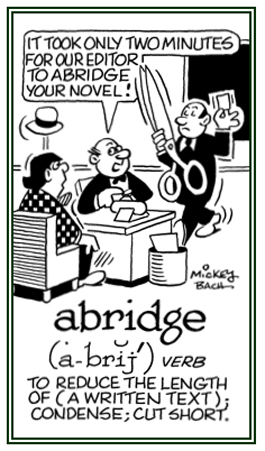brevi-, brev- [brie-, bri-] +
(Latin: short; shorten, make shorter, shortened)
2. To shorten a piece of text by cutting out sections or paraphrasing it, as in abridging or shortening: The speaker abbreviated his lecture so the audience could go home before the thunderstorm started.
3. Etymology: the -brev- in abbreviate, abbreviates, etc. came from Latin brevis, meaning "short", which is also the source of the word brief; therefore, abbreviate means "to make briefer, to make shorter" by combining or omitting elements of the contents of a verbal or a written message.
2. Regarding the reduction of a word or a name to a shorter form: The abbreviated form for the "United States of America" is "U.S.A."; the more abbreviated form is the "U.S."; for "Doctor", it's "Dr.", and an abbreviated example of "business" is the informal term of "biz".
2. A shortened form of a spoken word, or written symbol; a part of a word or symbol standing for the whole: There are many abbreviations for title words and one common abbreviation is Mr. for Mister.
A very familiar abbreviation is "etc." which is the abbreviation for "et cetera" meaning "and the rest", "and others", "and so forth" which is used at the end of a list to indicate that other items of the same class or type should be considered or included.
Taking a shortcut in the city abridges the time the couple needs to get to the city in time for the concert.
The doctor is abridging his discussion about the operation because the audience appears to be tired or bored.
Bryan will abridge his original speech from five pages to just one page.
2. To abbreviate words, while retaining the sense and substance of the written text; to condense, to epitomize: The book was abridged to a more readable length.Within the past few years, publishers have found it necessary to abridge many classics in order to attract a greater reading public.
3. To produce by summarizing a larger work to a condensed form: The mayor agreed to abridge his comments to accommodate the featured speaker's schedule.4. To curtail, to diminish rights, privileges, advantages, or authority: No one should be able to abridge your legal rights.
5. Etymology: from Middle English abregen and Old French abregier, abreger, "to shorten"; from Latin abbreviare, "abbreviate"; from Latin ab-, "from, away from" +breviare, "to shorten".
Abridge and abbreviate both carry the idea of shortening so that what remains adequately represents the whole.
To abridge suggests the "cutting away" of nonessentials while keeping the most important meanings. To abbreviate is generally used in reference to words or phrases, or it implies shortening by the compression or omission of parts while the remainder stands for the whole, in other words to abridge a novel for its inclusion in a magazine.

Go to this Word A Day Revisited Index
so you can see more Mickey Bach illustrations.
2. Restricted, limited, curtailed, diminished, or someone who has been deprived of something: "No one should be allowed to abridge citizens of their legal rights."
3. A reference to a book, play, etc. that has been made shorter or condensed from the original but which contains the same basic story.
2. A compendium of a larger work, with the details and less important things omitted, but retaining the sense and substance; an epitome, or abstract: Did you see the new abridgment of Gibbon's Roman History?
The professor really liked the abridgment of the latest novel by his favorite writer that was published in the newspaper.
3. Etymology: Abridgment, or abridgement was borrowed from Old French abregement, from abregier, "to shorten, to diminish"; from Latin abbreviare, "to make short".2. A writ by which a person is summoned to answer an action, a complaint, etc. in a court of law.
3. A small curved diacritical mark, u curved or like a tiny smile, placed over a vowel to signify that the vowel has a short sound; with such words as: cat, pet, sit, hot, up, and cut.
2. In the Roman Catholic Church, the book containing the "Divine Office" for each day, which those who are in orders are bound to recite.

